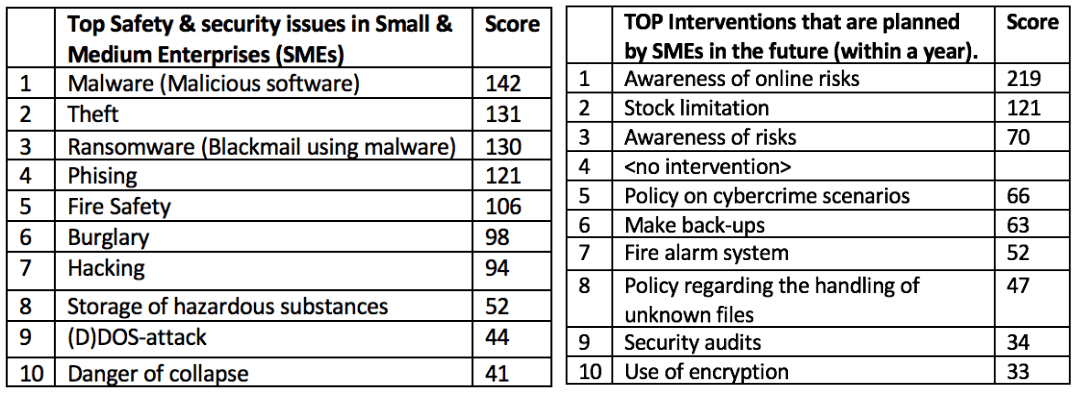Safety & Security of SMEs and the Future Demand for Talent
Recent research on the prevailing safety & security issues in Small & Medium Enterprises (SMEs) in the region of The Hague shows a diversity threats and solutions. The study also incorporated how education providers can train security professionals better to tackle these issues. For this research, various SMEs were visited and interviews were held with people who work for educational institutions.
Business in the Netherlands are 99% SMEs and more than 50% of SME-entrepreneurs are victims of security problems. An additional problem is that SMEs are not aware of safety & security issues. At the same time, 13 percent of the labour force is active in a safety or security related job. The distance between education and the labour market is too large, graduates cannot tackle the prevailing safety & security problems.
Half of the experienced security problems are ‘traditional’ safety & security challenges, the largest of these are theft and fire safety . The other half are problems with a digital origin (cybersecurity), the largest reported are malware and ransomware. The interventions that entrepreneurs want to perform in their future are less technical than the interventions that they are performing at the time of the survey. The most requested expertise related to interventions is cyber security. Awareness in security (both traditional and cyber) plays an important role in future interventions as well. The interviews with the different educational institutions show that curricula are not completely in line with the required expertise. Education should focus more on training people who can solve safety & security problems in SMEs.

SMEs can use the results of this study to collaborate with education providers on security. These providers should implement more cybersecurity in their curricula, pay more attention to the prevention and outsourcing of risks and teach students to raise awareness in organisations.
When prioritizing security issues, government agencies can take into account both cybersecurity issues and security issues without digital origin. Dealing with risks, awareness of both digital and other risks should be focal points in safety policies and support that is targeted at SMEs. For the City of The Hague specifically, the study provides insight into the priorities and needs of regional SMEs, and gives input for its local and regional labour market policy, education policy and security policy.
The research was conducted by Wassim Esseka for his bachelor thesis Safety & Security Management at The Hague University of Applied Sciences and commissioned by The Hague Security Delta and the City of The Hague.
It contributes to the goal of ‘’the Human Capital Agenda Security 2019 – 2022’’ that address the discrepancies in the labour market by improving the qualitative and quantitative alignment between supply and demand of security personnel. Examples of activities undertaken in SME-security field are the Cyberwerf project and activities together with the Chamber of Commerce.






















